Conrad Johnson's Blog, page 18
December 29, 2016
Book Review: The Prophetic Imagination that Trumps Business-as-usual
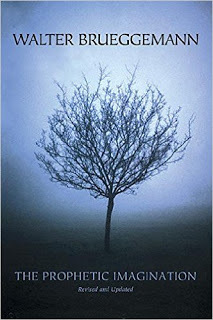
The Prophetic Imagination, by Dr. Walter Brueggeman, has sold over one million copies in its second printing and deservedly so. Now, more than ever, we need to closely examine the biblically historical power of language to counter culture a status quo, populist mindset that abnegates an alternative reality which offers the Creator's freedom through anguish and energizing, unlimited force.
Students (and admirers) of language need not be theologically inclined in order to appreciate the Chomsky-like tone regarding the hegemony of cautionary and hopeful prophecy as outlined in both the Old and New Testaments of the Bible as pointed out by Brueggemann. It's still the articulate, anguished scream of the little man against the powers that be which foresee destruction yet offer visionary change in the face of, what the author labels, 'royal consciousness', as personified in the struggle between the Moses of Exodus and the Pharaoh of an oppressive Egypt against the Hebrews in the ancient Middle East and, to a final extant, Jesus Christ against the Jews and their failure to perceive the spirit behind the Law, the spirit of agape love, as given to Moses and the Israelites. In effect, it's a bold step out of the the Hegelian Dialectic, which modern philosophers such as Marx refer to, and a grand entrance into another dimensional geopolitical world tension that resolves itself solely through the Creator's will and purpose--a firmament long ago established outside of time and space before the foundations of kingdoms and governments where laid.
Some things will never change like absolute governmental power that inevitably trends toward blind and merciless oppression of society's marginalized. But Brueggeman, like Chomsky, examines the tour de force manifested by powerful (and prophetic) forces of imagination that wield language as a new construct versus reality in the everyday life of an established regime that necessarily must be deaf to the pleas of poverty and helplessness, because if rulers acknowledge the chinks in their armor of authority, they will be forced to admit that imperfection inevitably can and must lead to change and, quite often, revolution.
For fiction writers and lovers, Brueggeman references what he calls the 'savage artistry' of Flannery O'Connor and her Southern Gothic style of bringing hurt and (what the author herself calls) Christian Realism to the forefront of literary consciousness. Taking the interpretation of her work beyond the limited anti-capitalist vision of Chomsky and others, such as Canadian author and social activist, Naomi Klein who necessarily prescribe to a one world view of alternative realities, Brueggeman writes in his preface:
I am sure, nonetheless, that the joining of "prophetic" to "imagination' leads inescapably in an artistic direction in which truth is told in a way and at an angle that assures it will not be readily cooped or domesticated by hegemonic interpretive power.
This begs the question: How is it possible to limit God's power at all? (Matthew 19:26) Pharaoh tried and failed as Brueggeman reminds us of the events recorded in Exodus--Moses personally confronting the royal consciousness and speaking unseen kingdom truth to power. The idea was unthinkable, laughable and finally irritating beyond degree, these words from a lowly Hebrew shepherd demanding Egypt set God's people free and, consequently, upset the entire internal balance of economy--no more loathsome slave labor to sweat blood over a grandiose infrastructure. "And how many legions does the Pope in Rome have?" reportedly asks one long dead military commander at a command from the Holy See. But a swipe at Catholicism here must be left as an aside if we are to press on with biblical truth and the alt-reality that comes with it.
Moses, indeed, was the first, and perhaps foremost, prophet in a long line of Old Testament prophets that continued, more often than not against the threat of execution, to remind the royal consciousnesses (both Jew and Gentile) that God uses His word to first create a New Other-world Order in the hearts and minds of mankind before backing it up with force if His message of justice towards the poor and marginalized is not recognized and acted upon. Only believers in the gospel can and will accept the anguish voiced by Isaiah and Jeremiah and others towards the Make Israel Great Again movement without leaning on the God that delivered them from slavery for help and guidance. Worshipping the might of men and country is as old as Methuselah and always prone to inevitable collapse, either by invasion or internal moral decay. After all, what's wrong with just following the Ten Commandments? Wouldn't everyone agree that the world would be a better place? But it can't be done, can it? Therefore, Brueggeman's submission that "prophetic must be imaginative because it is urgently out beyond the reasonable".
And, just because it is so, it is unpalatable for the powers that be to tolerate it simply for that reason--the heavenly language of hope and promise, coupled with the harsh condemnation of exposing business as usual--defies control. And without control, the royal consciousness smells chaos and a threat to its power. Indeed, things must go an as they are. Certain 'adjustments' in the body politic will be necessarily endured (drain the swamp, etc.), but the New Boss will always remain as the Old Boss unless he is replaced by the Lord himself.
With respect to Western (and more specifically, American) status quo, Brueggeman states that:
It is evident that in our American society, as in those brutal contexts, there are two types of imagination, that of "the generals and their opponents," or that of consumer ideology and its resisters. The fact is that we in American society too easily live "inside this imagination" when prophetic imagination is capable of enabling us to live inside "God's imagination" Clearly, human transformative activity depends upon a transformed imagination. Numbness does not hurt like torture, but in a quite parallel way, numbness robs us of our capability for humanity.
This is exactly what the writing of such authors as Flannery O' Connor attempt to do--shock us back into a morality incapable of our own making and willpower. The first step towards believing is hearing and the voice of the Old Testament prophets remind us of that. (Romans 10:17) Or who can stand against the poetic, prophetical anguish of those like Jeremiah without having their consciousnesses pricked? Only the very hard of heart says Scripture:
"Those who are for pestilence, to pestilence,and those who are for the sword, to the sword;those who are for famine, to famine,and those who are for captivity to captivity."
Or the uncovering of national sin and pride by the same prophet:
"This is your lot,the portion I have measured out to you,declares the Lord,because you have forgotten meand trusted in lies.I myself will lift up your skirts over your face,and your shame will be seen.I have seen your abominations,your adulteries and neighings, your lewd whorings,on the hills in the field,Woe to you, Jerusalem!How long will it be before you are made clean?"
Of course, nobody likes to tell the emperor that he has no clothes, let alone that he will be metaphorically raped for his sins and the sins of his people, so it's no wonder that a prophet's life is always cut short. Yet the good news is that along with this brazen clarity of vision and warnings, the messenger offers a new reality, eternal and pure, which the established can never hope to aspire to--one that threatens the very fabric of man's immoral nature, even in the least wicked. It's is God's very own promise of salvation from, what the Buddhist's call, the Wheel of Life--a way out for good that comes only through hearing which leads to faith. This penultimate counter culture voice has never been originated by man in the truest sense. Utopian cults come and go, speculations and governmental promises offer hope and change, but only the Kingdom of God which was spoken of to the backwoods rebels of Galilee first, and which did not originate in the halls of the royal Congress amidst the hilltops of Jerusalem, can break the chains that bind. Divine imagination is the main ingredient and, without it, we will never be able to eat our way into a perfect world in this life as Brueggeman so colorfully explains.
The Prophetic Imagination, is a book, not only for theologians, but one for those of us who admire the power of ideas and the utilization of poetic language to facilitate a crack in the universe of an otherwise prosaic existence that offers little in a world full of political speculation, limited goodwill and no meaning beyond that which is offered by decree... for God has spoken.
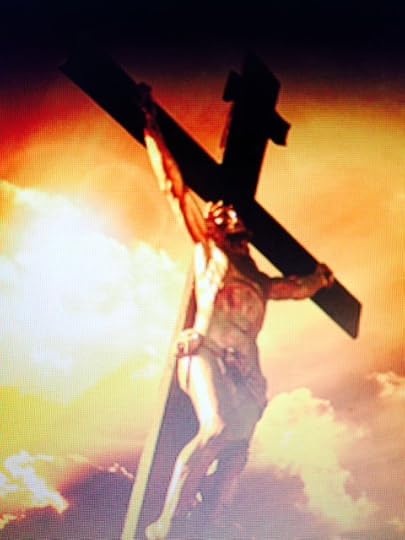
www.theruggedcross.org
Published on December 29, 2016 12:46
December 25, 2016
Movie Review: Lo and Behold:Reveries of the Connected World
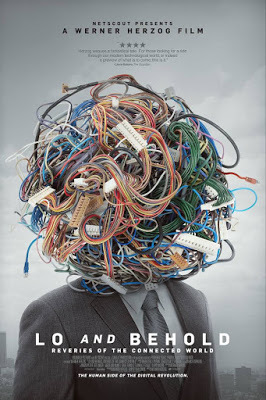
"People are the weakest link in technology."Kevin MitnickConvicted Federal criminal hacker, con man and founder of Mitnick Security Counseling
Lo and Behold: Reveries of the Connected World, a 2016 documentary that investigates the complexities of the cyberworld in which we live today is wrongly named. The film is not a rapturous exploration of the birth and growth of Internet technology and the subsequent advantages to 21st century humanity that it offers. Instead, it quickly spirals into a dark and cautionary exposition of the possible and terrible things that have gone, and still might go wrong, because of our frighteningly infantile dependence on a fragile web of circuits and signals that sustain almost all functions of modern life from food chain distribution to interpersonal communications and, subsequently, through default of human nature--war.
To be sure, there is some incredible cutting edge, robotic footage included in the documentary, but the speculation associated with these clips, through closely linked interviews with some keen scientific minds, implicitly reveals director Werner Herzog's bias against a moral omniscience. Filming saffron clad, Buddhist monks meandering along a Chicago waterfront, tweeting obsessively is as pitifully close as the documentary comes to acknowledging that there just might be an unseen power, or powers, at work behind the scenes that does not require an artificial plug in energy source. The arbitrary forces of nature are scarcely mentioned (and almost irreverently acknowledged) in the passing reminder of the 1859 Carrington Event which lit up the globe and caused telegraph machines around the world to spontaneously catch fire as a result of unpredictable, massive solar flares.
For those of us who do not subscribe to the false premise that a belief in a Creator and the potentials of rational scientific research and development are automatically mutually exclusive, Lo and Behold falls way short of even SpaceX founder, Elon Musk's, amazing hope that a few highly privileged folks on this fallen planet will one day save mankind by colonizing Mars. It is the stuff that Philip K. Dick, science fiction fans dreams are made of and which Herzog feverishly ascribes to by embarrassingly volunteering to be the first to go as Musk blinks his eyes incredulously before the camera during the exclusive interview.
All in all, Lo and Behold, is a rather attractively shiny but dark, wanna-be-mad-scientist's view of what the world has become as a result of our insane addiction and dependence on the Internet, which was primarily designed for military use, and that just may end up being the initial code that unravels The Machine through self destructive human behavior which clearly manifests itself throughout the film, portrayed side by side with exponential advances in robotics and artificial intelligence. If mankind is 'evolving', than the bloodiest and most gruesome world wars of the 20th century certainly do not testify to this false theory that replace God's eternal plan of salvation and redemption with relative concepts of morality. If you still believe after watching this documentary that technology will save the earth and that greed and lust will one day be miraculously replaced by a spontaneous eruption of a global consciousness of love towards one another, you should probably hit RESTART and reconsider. Christianity, after all, is a thinking man's religion despite prevalent and popular arguments to the contrary.
Come now, let us reason together, says the Lord:
though your sins are like scarlet,
they shall be as white as snow;
though they are red like crimson,
they shall become like wool.
--Isaiah 1:18
Published on December 25, 2016 20:53
Film Review: Lo and Behold:Reveries of the Connected World

"People are the weakest link in technology."Kevin MitnickConvicted Federal criminal hacker, con man and founder of Mitnick Security Counseling
Lo and Behold: Reveries of the Connected World, a 2016 documentary that investigates the complexities of the cyberworld in which we live today is wrongly named. The film is not a rapturous exploration of the birth and growth of Internet technology and the subsequent advantages to 21st century humanity that it offers, instead it quickly spirals into a dark and cautionary exposition of the possible and terrible things that have gone, and still might go wrong, because of our frighteningly infantile dependence on a fragile web of circuits and signals that sustain almost all functions of modern life from food chain distribution to interpersonal communications and, subsequently, through default of human nature--war.
To be sure, there is some incredible cutting edge, robotic footage included in the documentary, but the speculation associated with these clips, through closely linked interviews with some keen scientific minds, implicitly reveals director Werner Herzog's bias against a moral omniscience. Filming saffron clad, Buddhist monks meandering along a Chicago waterfront, tweeting obsessively is as pitifully close as the documentary comes to acknowledging that there just might be an unseen power, or powers, at work behind the scenes that does not require an artificial plug in energy source. The arbitrary forces of nature are scarcely mentioned (and almost irreverently acknowledged) in the passing reminder of the 1859 Carrington Event which lit up the globe and caused telegraph machines around the world to spontaneously catch fire as a result of unpredictable, massive solar flares.
For those of us who do not subscribe to the false premise that a belief in a Creator and the potentials of rational scientific research and development are automatically mutually exclusive, Lo and Behold falls way short of even SpaceX founder, Elon Musk's, amazing hope that a few highly privileged folks on this fallen planet will one day save mankind by colonizing Mars. It is the stuff that Philip K. Dick, science fiction fans dreams are made of and which Herzog feverishly ascribes to by embarrassingly volunteering to be the first to go as Musk blinks his eyes incredulously before the camera during the exclusive interview.
All in all, Lo and Behold, is a rather attractively shiny but dark, wanna-be-mad-scientist's view of what the world has become as a result of our insane addiction and dependence on the Internet, which was primarily designed for military use, and that just may end up being the initial code that unravels The Machine through self destructive human behavior which clearly manifests itself throughout the film, portrayed side by side with exponential advances in robotics and artificial intelligence. If mankind is 'evolving', than the bloodiest and most gruesome world wars of the 20th century certainly do not testify to this false theory that replace God's eternal plan of salvation and redemption with relative concepts of morality. If you still believe after watching this documentary that technology will save the earth and that greed and lust will one day be miraculously replaced by a spontaneous eruption of a global consciousness of love towards one another, you should probably hit RESTART and reconsider. Christianity, after all, is a thinking man's religion despite prevalent and popular arguments to the contrary.
Come now, let us reason together, says the Lord:
though your sins are like scarlet,
they shall be as white as snow;
though they are red like crimson, they shall become like wool.--Isaiah 1:18
Published on December 25, 2016 20:53
December 12, 2016
The Physician-Movie Review (a second opinion)
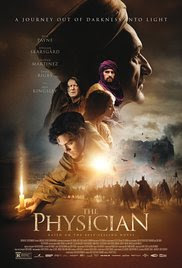 Photo credit: IMDB
Photo credit: IMDBIf you missed the 2013 Noah Gordon, novel based film, The Physician, starring Tom Payne, here's a second opinion from a third time viewer.
God works in mysterious ways says the proverb, and if you cinematically follow this brilliantly told sojourn of an English peasant boy's search for knowledge from 11th century England to Arabianized Jerusalem (implicitly evident yet not named in the film), you will be royally entertained by Phillip Stölzl's surgical scene splicing and directing. Novices just remember this--the first cut is the deepest.
What I mean is that the movie opens up in rural England during the so called "Dark Ages" and shows us, quite harshly, what life, love and death were like in a church dominated culture of blind legalists and misguided literalists, religious bureaucrats who forbade autopsies and kept all truths buried under sackcloth purchased from sinful indulgences-hard earned pennies that child labor and poverty forced prostitution imposes on the poor and oppressed. Some things never change.
Tom Payne plays Rob Cole, an orphan boy who breaks rocks all day just for half a loaf of bread to take home to his fatherless family when a 'barber', colorfully portrayed by Swedish born,
 Emma Rigby 2016
Emma Rigby 2016The voluntary suspension of disbelief comes easy in this movie, so it's not a far stretch to suggest that Kingsley's character, the legendary Jewish healer, Ibn Sina, is loosely based upon the historical figure, Maimonides. Rob Cole gets a spot in his school exclusively reserved for the princes of Persia solely because of his visible passion and thirst for medical knowledge and power-medicine for medicine's sake, if you will.
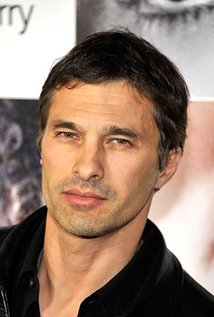 Olivier Martinez
Olivier MartinezYou can follow this hero's epic journey that resolves itself in glory, both royally as with Cole's unlikely befriending by the shah handsomely played by,

Published on December 12, 2016 00:19
November 29, 2016
Netflix Movie Review--The Finest Hours
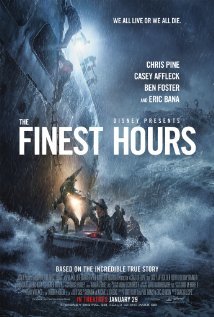
And let them sacrifice the sacrifices of thanksgiving, and declare his works with rejoicing. They that go down to the sea in ships, that do business in great waters; These see the works of the Lord, and his wonders in the deep. Psalm 107:22-24
The Finest Hours, a true story of miraculous courage and seamanship exhibited by U.S Coast Guardsmen in the fierce winter storm of 1952 off the New England coast, is now available on Netflix for live streaming.Chris Pine does a believable job of portraying Boatswain Mate Bernard Webber, the small boat coxswain who led his small but intrepid crew across the treacherous bar at Chatham Bay, Massachusetts to find and retrieve the surviving crew of the American oil tanker, Pendleton, after it split in two in the waters off Cape Cod. Seemingly against all odds, and with the local Coast Guard stretched thin in resources because of another oil tanker, the Fort Mercer, which also broke apart in the same storm just miles away. You are strongly encouraged to read the historical account of what happened on that fateful day in February in the Coast Guard's online historical archive before going any further into this review. It is definitely a case of truth being far more fantastic than fiction.If you liked The Perfect Storm, starring George Clooney, then you will definitely enjoy the spectacular production that went into the making of this film also. There's more that can be said from an objective reviewer's point of view but I am more than that. I'm a Coast Guard search and rescue veteran myself, having served in stations along the Pacific Northwest and within the Great Lakes region. Also, I worked aboard merchant freighters as an Able Bodied Seaman on all three of America's coasts and within inland waters. This experience gives me a unique perspective on the film's sense of reality.First of all, the movie is based on the non-fiction book, The Finest Hours: The True Story of the U.S. Coast Guard's Most Daring Sea Rescue, coauthored by Michael J. Tougias and Casey Sherman which I'll probably be reviewing in the near future. (You can see my other book and film reviews on this blog site also). So, according to other film critics, the historical rescue scenes of this movie are very close to true but the love interest, although cutesy, is completely fictionalized. Yet I digress.The main point which I press to conclude with is this: We, as a nation, have become so far removed from our past, forgetting that we are bordered by three oceans that connect us to the rest of the world. At one time, America dominated seagoing business and commerce and our great history, and the brave men who filled out its pages on the waters of this land, is all but forgotten to most of us. We sit in traffic in our little metal islands of four wheels, separated from the vast manifestation of God's handiwork that made our relatively easy and prosperous lives possible and have denied the Creator's role in almost all of our lives. Even in the film, God is wiped out because the truth is that the Coast Guard crew sang the hymn "Rock of Ages" as they departed the comfort of land into treacherous waters, trusting in our Lord and He rewarded them with supernatural guidance and protection that will remain forever legendary. The filmmakers decided to replace this truth in the movie with a bawdy sailor ditty sung by the terrified crew and this is, sadly and ultimately, what we who have gone down to the sea in ships who fear the Lord must lament in these latter days. Semper Paratus--"Always Ready" is the motto of the nation's oldest seagoing outfit and "the joy of the Lord is my strength" is for those of us who profess truth unashamedly still.

Published on November 29, 2016 22:14
September 29, 2016
A Noble Intention (Publieke Werken)--Netflix Film Review

The 2015 Dutch film, A Noble Intention, is a modern historical drama set in late 19th century Amsterdam which is currently available to stream on Netflix in the U.S.A. The movie is based on the novel by actor and author, Thomas Rosenboom, who won the distinguished Libris Literature Award twice. He is the only author to have ever done so.
Frank Ketelaar makes the story come alive for movie fans in his excellent screenplay rendition which is directed by Joram Lürsen giving one the overall impression of timeless authenticity reminiscent of classical dramas in both the literary and film genres of storytelling.
Pulieke Werken, or "Public Works" in English, is a much better title for this compelling tale of how progress at the cost of individualism affected many in the West. Perhaps what is most moving about this film, along with its superb acting, is the sense that the spirit of Anne Frank seems embedded within Dutch sensibilities to the intelligent viewer. In other words, despite the Dutch Protestant desire to dominate the social milieu of their Golden Age, both spiritually and economically, the soft heart of the ordinary Netherlander has really the noblest intention--to lift everyone in their society on the rising tide of progress and protect them from abuse. This sentiment contradicts the adage that "when a Jew cries, others laugh." Bravo.
Published on September 29, 2016 17:40
September 21, 2016
Quick and Concise: A Review of John Calvin's Classic Work
 Institutes of the Christian Religion, 2 Vols by John Calvin
Institutes of the Christian Religion, 2 Vols by John CalvinMy rating: 5 of 5 stars
Calvin's name invites hatred among Christians almost as much as Christ's did among the Jews. This classic exposition of almost every conceivable biblical doctrine is biting and incentive, truthful and hurtful (to more than a few) and still regarded as the high water mark of theological Reformation truth to date which began with St. Augustine, more or less centuries before him. The story surrounding Calvin's legacy, which is not included here, is also controversial. Basically, in my studied opinion, if it's not controversial and ground shaking, then it's not Christianity. Semper reformando.
View all my reviews
Published on September 21, 2016 13:42
September 3, 2016
Classic Movie Review: Clint Eastwood in Pale Rider (Kurosawa meets Christ Jesus)
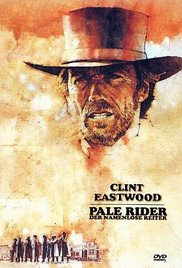
The 1985 classic cowboy western, Pale Rider, starring and directed by the legendary Clint Eastwood deserves another, closer screening and pithy review in light of world events in the 21st century. Let me explain.
For film fans who are unaware of biblical, apocalyptic prophecy, the term "pale rider" denotes special meaning for people interested in eschatology-or end times terminology.The opening scene stars the then young, and now still beautiful, Sydney Penny, as Megan Wheeler as the teenage daughter of a gold miner's deserted wife in the rugged California canyons during the mineral rush of the mid 19th century.
 Sydney Penny
Sydney PennyShe is reading from the Book of Revelation (the last book of the Bible) just before a vicious raid by a posse is sent by the greedy and successful neighboring, large scale industrial miner, Coy LaHood played by Richard Dysart. LaHood destroys the natural lay of the land with then, modern strip mining activity and he despises the collective of individual miners called 'tin pans'. In brief, it's the same story of the Old Wild West's developing economy--evil robber barons against the simple, good man who is just trying to make an honest living.
Penny reads these verses from the Bible as an angry, thundering cloud of hell bent men on horseback charge down the canyon slopes to her location in order to bust things and send a strong signal for the miners to move on. She reads Revelation chapter 6, verse 8:
And I looked, and behold a pale horse:and his name that sat on him was Death,and Hell followed with him.
Even those of us familiar with this supernatural description of prophetic events during the last days on earth before God sends His only begotten son, Jesus, to wrap up things and restore the cosmos to its intended perfection, may not know that the actual Greek word translated here into King James English is chlóros, or pale green, the color of Islam. Draw your own conclusions.
Anyhow, after the angry raiders rampage the small shanty town on the fictional Carbon Creek and unnecessarily kill Megan's dog, the girl buries her pet and prays for a miracle. Lo and behold, the former gunfighter turned preacher, Eastwood, shows up on that very day to save the miners in a series of well crafted, finely acted scenes that link together meaningfully, cinematically and with some occasional corny theme music thrown in which does not distract too much from the otherwise brilliant production that Hollywood today with all its technology and confused 'creative' artists can't touch.
The movie is iconic for at least a couple of reasons. First of all, church history shows that God uses converted sinners, and transforms their evil skills for His purpose and plan of salvation. The licentiousness of St. Augustine, for example, becomes an outpouring of definitive interpretations of doctrine, specially related to sin and the consequences of sinful behavior. Martin Luther's cloistered intensity prepares him to stand against the world and reform church doctrine in a highly controversial and permanent way. And then there's the traveling St. Paul of Tarsus in the New Testament who likes to go from town to town and throw new Christians into prison so God uses him to keep on the move and evangelize the Gentile, Greek speaking world of that era, leaving us believers with a legacy and foundation of written exhortation and explanation that continues to shape the modern world.
Another iconic movie tool, is based on the Japanese filmmaker Kurowsawa's mythic, Seven Samurai, in a plot reversal. Instead of the persecuted miners hiring a team of bad guys to fight the good guys for them, bastard miner and not very eco-friendly, LaHood hires a team of 'marshals' to finish the job and drive the rag tag, tin pans out of sight--permanently. This forces Eastwood, who is only referred to as 'preacher' throughout the movie, to put away his collar and pick up his gun again and face off against the hired guns in classic Sergio Leone, spaghetti Western style complete with a squinty eyed Eastwood with the sun at his back against the mountain tops, standing square shouldered and deadly calm in the middle of town for what turns out to be anything but a fair fight.
Penny, as Megan, rounds out the biblical and eternal battle of good against evil, shouting out her adolescent professed love to a stone cold Eastwood's back, already riding his pale horse up and out of sight into the mountains. It's a scene that echoes emotion, righteous power, and forgiven violence that can only allude to God's majesty in the allegorical mode. I rented and watched the film on Amazon Instant video in HD for $3.99. Not a bad deal for a traditional fan of classic Western movies on a weekend afternoon. See you at the revelation which won't be televised, I'm afraid.
Published on September 03, 2016 18:32
August 30, 2016
Will it be Marxism or Christianity? Do you know the difference in detail?
 Main Currents of Marxism: The Founders, the Golden Age, the Breakdown by Leszek Kołakowski
Main Currents of Marxism: The Founders, the Golden Age, the Breakdown by Leszek KołakowskiMy rating: 5 of 5 stars
Kolakowski reviews and summarizes the history of Marxism with as much nuance and precision to detail as Chopin dealt with music in his piano concertos. The author is a maestro of holistic interpretation while at the same time paying excruciating detail to references and influences that shaped, transformed, radicalized and pragmatically utilized Marxist philosophy from its very inception until the 1970's. I would be willing to bet that most people who call themselves Socialists or attack Socialism have no idea behind the complex debates that formed this humanistic philosophy. Drawing from an extensive collection of manifestos and books on the subject from mostly European sources, Kolakowski is brilliantly able to paint an eloquent picture of this often, misunderstood and misapplied philosophy. My favorite line of his in this work (which I here paraphrase) is that Marxism can be compared to Christianity because of the multitude of interpretations derived from core beliefs of both ethical systems of thought. My only criticism of his approach, which reflects his Polish background, is the heavy handed contempt that he attributes to Marxism/Leninism and its resultant growth into Stalinism. Yet he expounds upon his seemingly biased view with credible facts which are hard to deny. After reading this tome, it is unavoidable to come to the conclusion that Marxism fails ultimately because of the frailties of human nature. There can be no worldwide, worker's Utopia because man is inherently exploitive and, to believe otherwise, is sheer folly. If "religion is the opiate of the people," then Marxism is the rabbit hole of philosophical thought and offers no definitive solution to the societal dilemma faced by modern man. There's more on this on my website at writers alive.
View all my reviews
Published on August 30, 2016 15:28
August 15, 2016
Dr. Martyn Lloyd-Jones and the Gospel (for believers only)
If you are believer in Christ and crave sound and timeless expository preaching like I do in this modern day climate of powerlessness within the Church, I urge you to visit Dr. Martyn's trust website at http://www.mljtrust.org/meet-mlj/
Published on August 15, 2016 10:59
Conrad Johnson's Blog
- Conrad Johnson's profile
- 47 followers
Conrad Johnson isn't a Goodreads Author
(yet),
but they
do have a blog,
so here are some recent posts imported from
their feed.



